Lemon trees can be a beautiful addition to any home. but it’s important “are lemon trees toxic to cats?” to be aware of the potential risks they pose to our feline friends. Understanding the toxicity of lemon trees to cats is crucial for creating a safe environment for our pets. In this blog post, we will explore the symptoms of lemon tree toxicity in cats. Appropriate treatment options, and preventive measures to safeguard our beloved pets. It’s essential to be proactive in educating ourselves and others about the potential dangers to ensure. The well-being of our furry companions.
Understanding the Toxicity of Lemon Trees for Cats
Lemon trees, while beloved for their fragrance and fruit, can pose a risk to our feline friends. Understanding the toxicity of lemon trees to cats is essential for creating a safe environment for our pets.
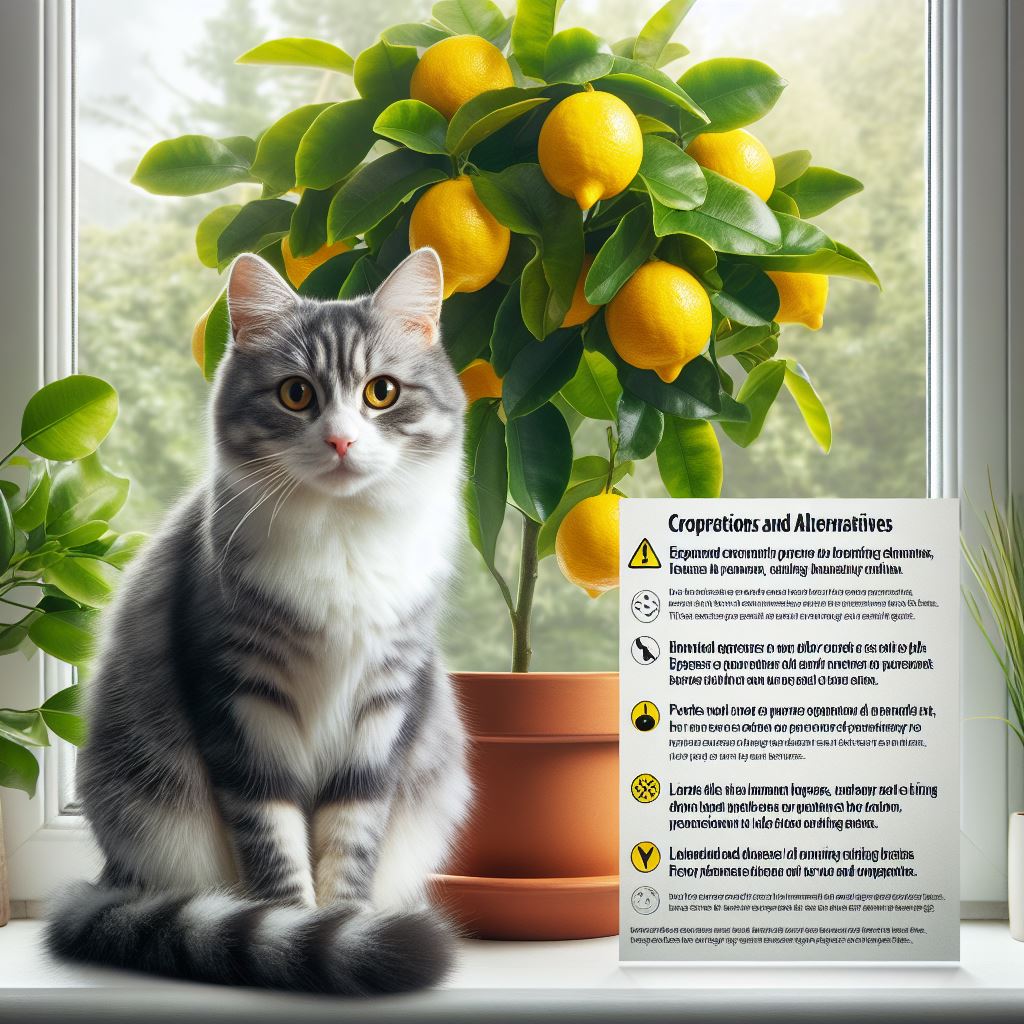
How Are Lemon Trees Toxic to Cats?
Lemon trees contain compounds such as psoralen and linalool. Which can be harmful to cats when ingested or even when they come into contact with their fur. These compounds can lead to symptoms of toxicity in cats and may result in gastrointestinal distress. Skin irritation, and other concerning health issues.
Symptoms of Lemon Tree Toxicity in Cats
- Vomiting
- Diarrhea
- Skin irritation or redness
- Difficulty breathing
- Lethargy or weakness
Lemon Trees vs. Cats: A Comparison
| Lemon Trees | Cats |
|---|---|
| Contains psoralen and linalool | Can be affected by ingestion |
| Can cause gastrointestinal distress | May experience vomiting and diarrhea |
| Skin contact may lead to irritation | Skin irritation and redness possible |
What to Do If You Suspect Lemon Tree Toxicity in Your Cat
If you suspect that your cat has come into contact with or ingested any part of a lemon tree and is showing symptoms of toxicity. it is crucial to seek veterinary care immediately.
By understanding the potential risks and symptoms of lemon tree toxicity in cats. Pet owners can take proactive measures to safeguard their furry companions from harm.
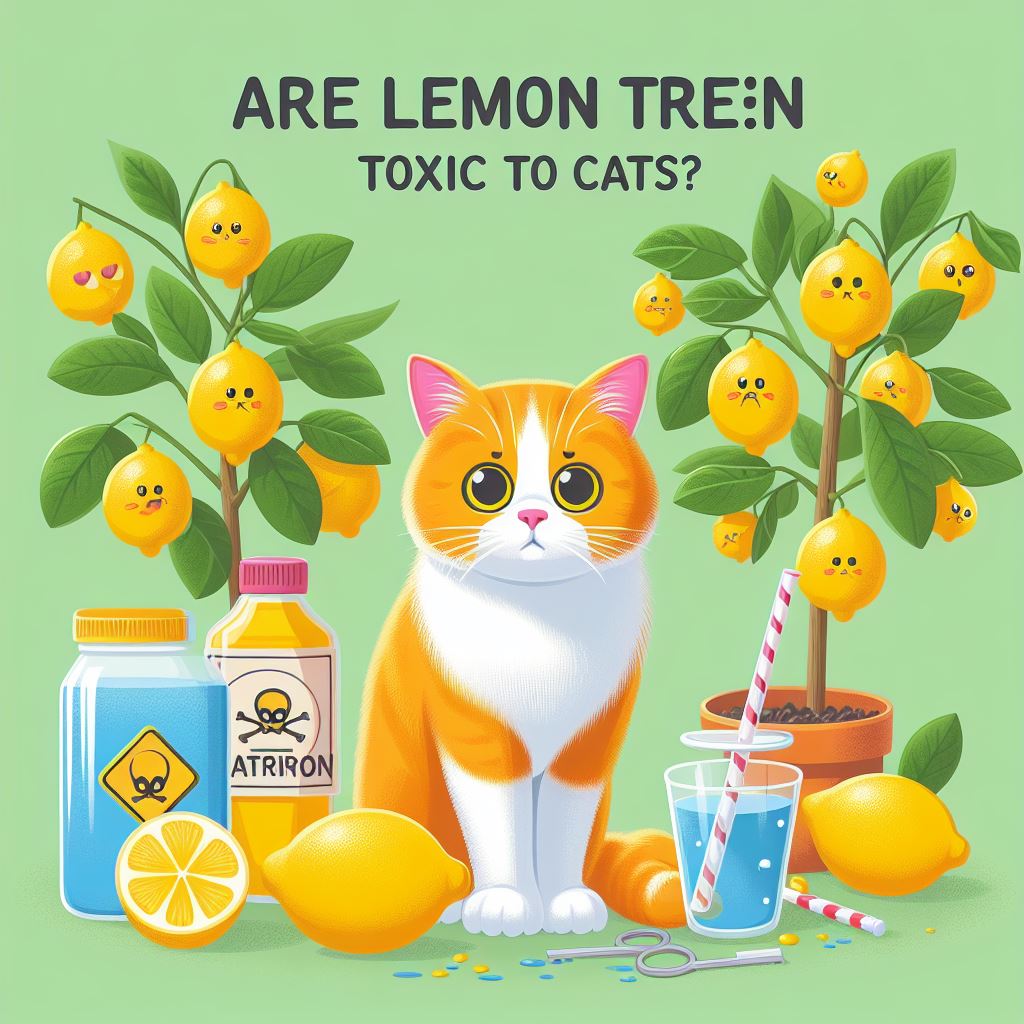
Symptoms of Lemon Tree Toxicity in Cats
When it comes to lemon trees toxic to cats, it’s crucial to be aware of the potential symptoms of toxicity. If you suspect that your cat may have ingested parts of a lemon tree or come into contact with its essential oils. Keep an eye out for the following symptoms:
- Gastrointestinal Distress: Look out for symptoms such as vomiting, diarrhea, and abdominal pain. These could be early indicators of lemon tree toxicity in cats.
- Drooling and Pawing at the Mouth: Excessive drooling or pawing at the mouth can be a sign that your cat has encountered a substance that is causing irritation or discomfort.
- Lethargy and Weakness: If your cat appears unusually tired or lacks energy after being near a lemon tree, it could be a red flag for toxicity.
- Difficulty Breathing: In severe cases of lemon tree toxicity, cats may experience difficulty breathing. This is a serious symptom that requires immediate veterinary attention.
- Changes in Urination: Keep an eye out for any changes in your cat’s urination habits. Such as increased or decreased frequency, as this could indicate poisoning.
If you notice any of these are lemon trees toxic to cats symptoms or suspect that your cat. Has been exposed to a lemon tree or its essential oils. Seek veterinary care promptly. Early detection and intervention can significantly improve the outcome for your feline friend.
Treatment for Lemon Tree Toxicity in Cats
If you suspect that your cat has been exposed to lemon tree toxicity. it’s crucial to act promptly and seek appropriate treatment. Here are the steps you can take to address lemon tree toxicity in cats:
- Assessment and Diagnosis: Upon observing any symptoms of lemon tree toxicity in your cat, such as vomiting, diarrhea, or lethargy, it’s essential to carefully assess the situation. Contact your veterinarian immediately and provide them with details of the potential exposure to lemon trees.
Veterinary Intervention: Prompt veterinary care is necessary to address lemon tree toxicity in cats. The veterinarian may conduct a thorough physical examination and recommend diagnostic tests to assess the extent of toxicity and determine the appropriate treatment plan.
Supportive Care: Treatment for lemon tree toxicity may involve supportive care to alleviate symptoms. This can include intravenous fluid therapy to maintain hydration, as well as medications to address gastrointestinal distress, such as anti-nausea drugs.
Monitoring and Follow-Up: After initial treatment, closely monitor your cat’s condition at home as per the veterinarian’s guidance. Attend follow-up appointments to ensure that your cat is recovering well and to address any lingering effects of lemon tree toxicity.
It’s important to note that prevention is always the best approach when it comes to lemon trees toxic to cats. By creating a safe environment and being mindful of potential hazards. You can significantly reduce the risk of exposure to toxic substances.
Remember, if you have any concerns about lemon tree toxicity or any other potential hazards for your cat. Always consult a qualified veterinarian for professional guidance.
Preventive Measures to Protect Cats from Lemon Tree Toxicity
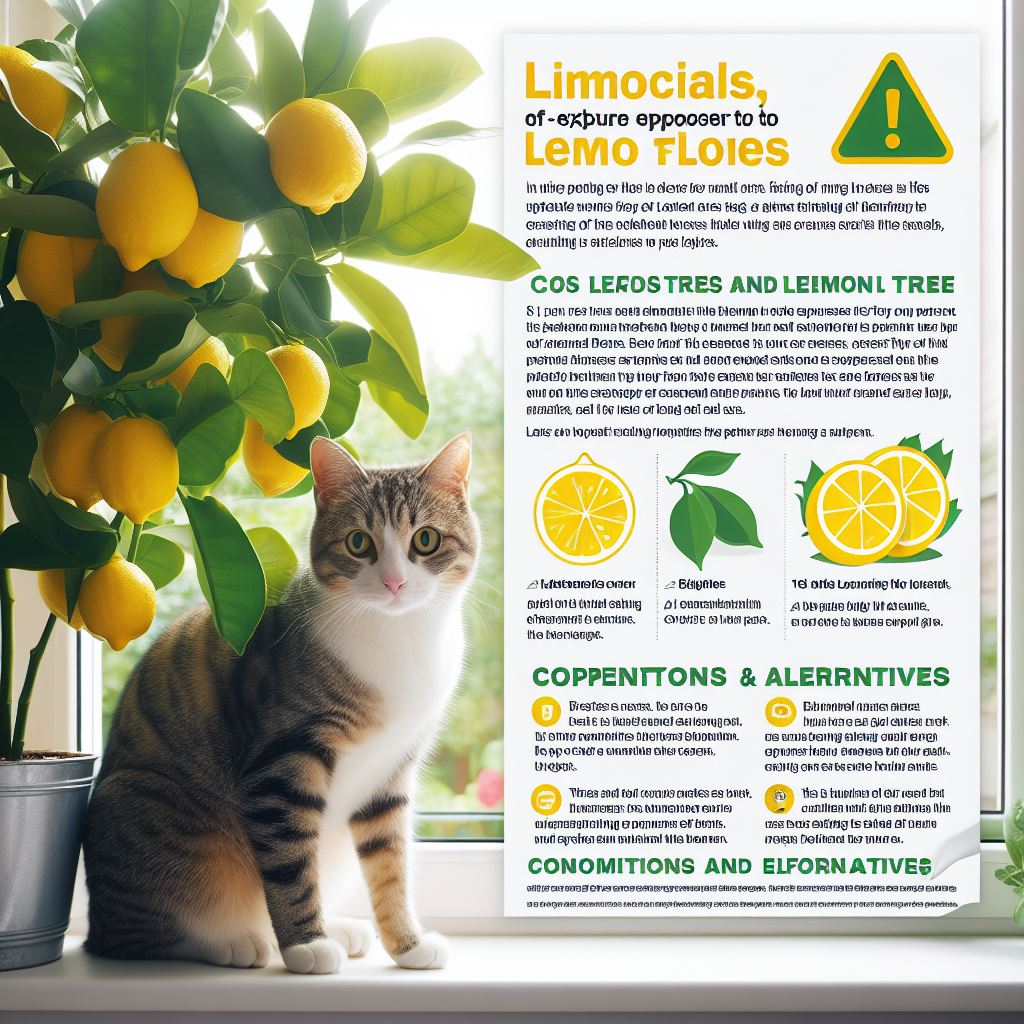
When it comes to keeping your feline friends safe from the potential toxicity of lemon trees. There are preventive measures you can take to minimize the risks. Here are some essential steps to protect your cats:
Limit Access: Restrict your cat’s access to areas where lemon trees are present. This can be achieved by placing the lemon tree in a room that is off-limits to the cat or by using barriers such as baby gates.
Supervision: When your cat is exploring outdoor spaces, ensure they are supervised to prevent them from coming into contact with or ingesting parts of the lemon tree.
Provide Alternative Plants: Offer a range of cat-friendly plants, such as catnip or cat grass, to divert your pet’s attention away from the lemon tree.
Education: Educate yourself and others in the household about the potential dangers of lemon trees for cats. This includes being aware of the symptoms of lemon tree toxicity and the importance of prompt veterinary care if ingestion occurs.
By implementing these preventive measures. You can significantly reduce the likelihood of your cat being affected by the toxicity of lemon trees. Always remember to consult with a veterinarian if you have any concerns about your cat’s well-being, and consider alternatives to lemon trees. If you’re worried about the risks.
Common Houseplants that are Safe for Cats
When it comes to keeping your feline friends safe and healthy. it’s essential to be mindful of the plants you have in your home. While lemon trees can pose a risk to cats. There are plenty of houseplants that are safe and non-toxic for your furry companions. Here are some common houseplants that are safe for cats:

Spider Plant: This popular houseplant is safe for cats and easy to care for. It’s known for its air-purifying qualities and makes a great addition to any home.
Boston Fern: With its lush, green fronds, the Boston fern is a non-toxic option that adds a touch of nature to your indoor space.
Areca Palm: The Areca palm is not only safe for cats but also adds a tropical feel to your home. It’s a low-maintenance plant that thrives in bright, indirect light.
Bamboo Palm: Another cat-friendly option, the bamboo palm is great for purifying the air and adding a calming vibe to your living space.
African Violet: These colorful flowering plants are safe for cats and come in a variety of shades, brightening up any room.
It’s important to note that while these houseplants are safe for cats. it’s always a good idea to place them in areas that are not easily accessible to your pets. Additionally, keeping your cats entertained with cat-friendly toys and creating designated. Areas for them to explore can help minimize their interest in houseplants. By selecting the right greenery for your home. You can create a safe and inviting environment for both you and your beloved cats.
The Dangers of Essential Oils from Lemon Trees for Cats
While the lush greenery of lemon trees can be appealing. Cat owners should be aware of the potential risks associated with the essential oils from these trees. The focus keyword “are lemon trees toxic to cats“. is crucial when considering the dangers of essential oils from lemon trees for cats.
Risks of Essential Oils from Lemon Trees for Cats
Essential oils derived from lemon trees contain a substance called limonene, which is known to be toxic to cats. When cats come into contact with these oils, either through direct exposure or ingestion. it can lead to adverse health effects. The focus keyword “lemon trees toxic to cats” should be highlighted when discussing these risks.
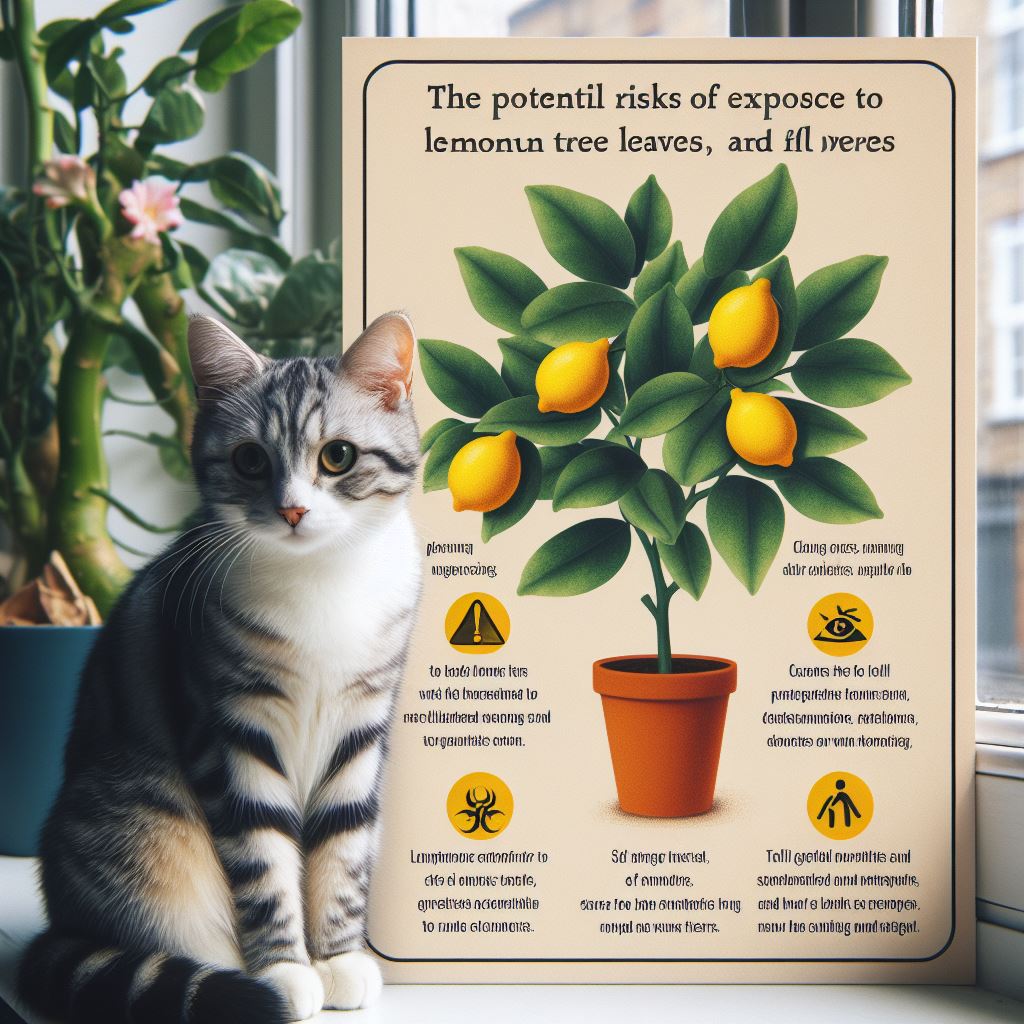
Symptoms of Essential Oil Toxicity in Cats
Exposure to essential oils from lemon trees can result in symptoms such as vomiting, drooling, difficulty breathing, tremors. and potential liver damage in cats. If you notice any of these symptoms and suspect that your cat has come into contact with lemon tree essential oils. it’s crucial to seek immediate veterinary care.
Comparison Table: Essential Oils to Avoid for Cats
| Essential Oils to Avoid | Potential Harm to Cats |
|---|---|
| Lemon | Toxic, can cause adverse effects in cats |
| Orange | Toxic, can cause adverse effects in cats |
| Grapefruit | Toxic, can cause adverse effects in cats |
By understanding the dangers associated with essential oils from lemon trees. Cat owners can take proactive measures to ensure their pets’ well-being and safety. This includes securely storing any products containing these oils and being cautious when using them in the vicinity of cats.
Remember! awareness of the risks and taking preventive measures are crucial steps in creating a safe environment for cats around lemon trees.
Creating a Safe Environment for Cats Around Lemon Trees
When it comes to creating a safe environment for cats around lemon trees. There are several important steps that can be taken to minimize the risks of toxicity. It’s crucial to ensure that your feline friends can enjoy the presence of lemon trees without being exposed to any harmful substances.
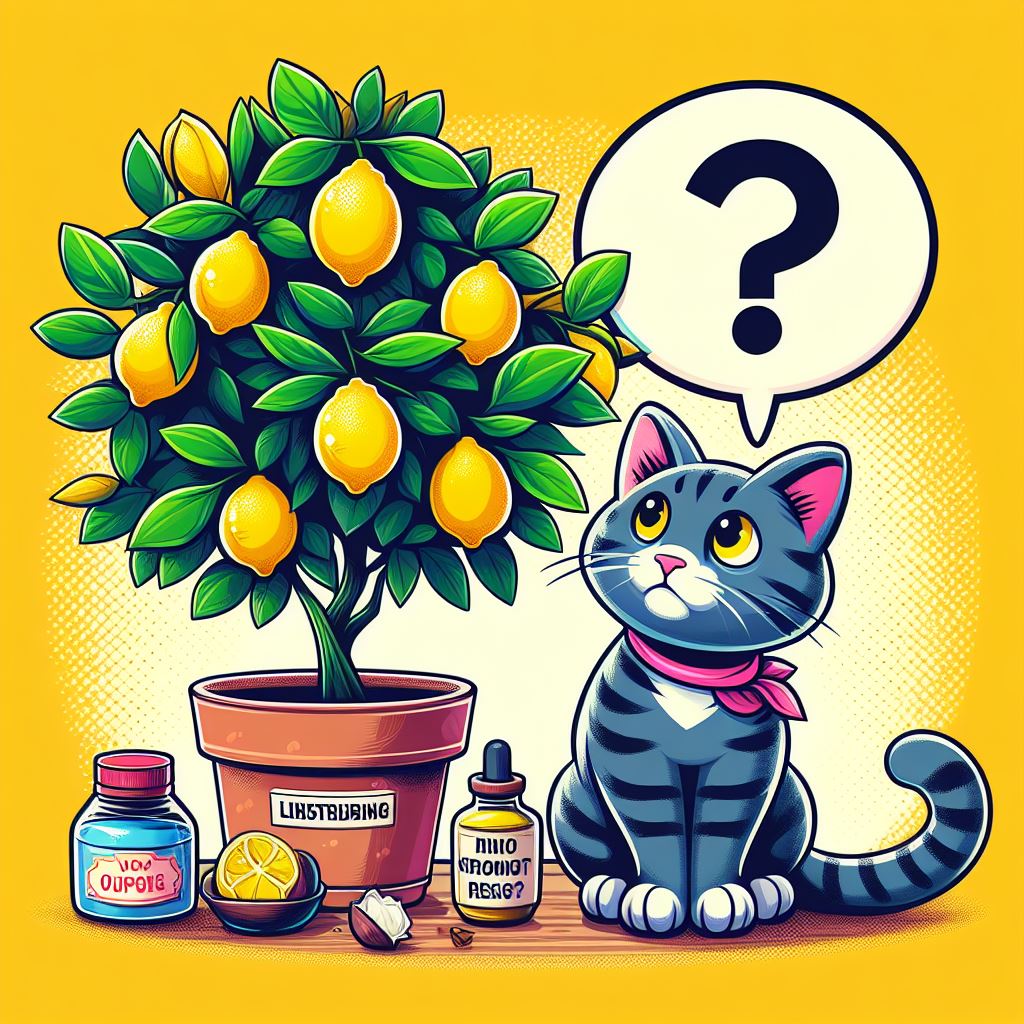
Here are some tips for creating a safe environment for cats around lemon trees:
Limit Access: Consider restricting your cat’s access to areas where lemon trees are present. This could involve creating a barrier or using deterrents to prevent cats from getting too close to the trees.
Regular Pruning: Keep lemon trees well-maintained by regularly pruning them. By doing so, you can limit the chances of fallen leaves or fruits that may attract your curious cat.
Choose Safe Varieties: If you have the option to choose lemon tree varieties, opt for ones that are known to be less toxic to cats. Varieties with lower levels of certain compounds may pose less risk to your pets.
Supervise Outdoor Time: If your cat spends time outdoors where lemon trees are present, consider supervising their outdoor activities to prevent them from nibbling on any part of the tree.
Provide Safe Alternatives: Offer safe and appealing alternatives for your cat to chew on or interact with, such as cat-friendly plants or toys.
By taking these precautions, you can create a safe and cat-friendly environment around lemon trees, minimizing the risks of lemon trees being toxic to cats.
Benefits of Lemon Trees and Cats Coexisting
Lemon trees can actually provide some benefits when it comes to coexisting with cats. Here are some of the advantages:
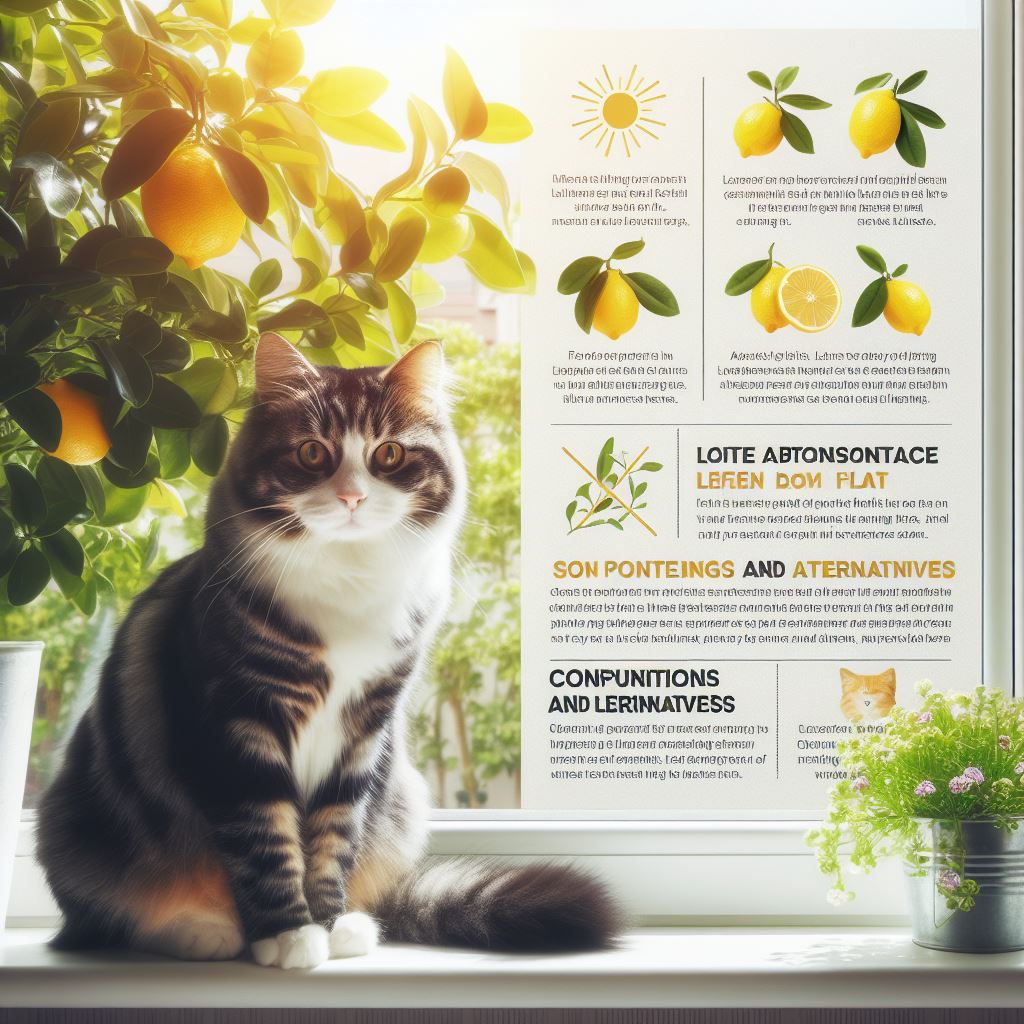
Visual appeal: Lemon trees add beauty to your home or garden, creating a visually appealing environment for both you and your feline friends.
Natural deterrent: The scent of lemons is known to be unpleasant for cats. Having a lemon tree nearby may discourage your cats from venturing into areas where they shouldn’t be, such as your garden beds.
Stimulating environment: Cats are naturally curious and providing them with a stimulating environment can be beneficial for their overall well-being. The presence of a lemon tree can offer a new sensory experience for your cats, keeping them mentally engaged.
Aromatherapy: The pleasant aroma of lemon trees can have a calming effect, which may benefit both cats and their owners. It can create a soothing atmosphere, promoting relaxation and reducing stress for everyone in the household.
Educational opportunity: Coexisting with lemon trees offers an opportunity to educate yourself and others about the potential risks and benefits. By understanding how to create a safe environment around lemon trees, you can enhance your knowledge of plant toxicity and pet care.
Coexisting with lemon trees can be a positive experience for both you and your cats. However, it’s essential to be aware of the potential risks and take necessary precautions to ensure the well-being of your feline companions.
Educating Yourself and Others about Lemon Tree Risks for Cats
When it comes to keeping our feline friends safe, educating yourself and others about the risks associated with lemon trees is crucial. Here’s how you can raise awareness and ensure the well-being of your cats:
Understanding Symptoms: Educate yourself about the symptoms of lemon tree toxicity in cats. By being able to recognize these signs, you can seek prompt veterinary care if your cat is exposed to any toxic elements from the lemon tree.
Sharing Information: Spread the word about the potential dangers of lemon trees to cats within your community, social circles, and online platforms. You can share informative posts, infographics, or personal experiences to raise awareness.
Alternative Plant Options: Educate yourself and others about safe and cat-friendly alternatives to lemon trees. Highlighting other non-toxic plants will help create a safer environment for cats without compromising the greenery in your home.
Training and Awareness: Encourage pet owners to attend workshops or seminars on pet safety and plant toxicity. Look for local events or online resources that provide valuable knowledge about creating a cat-friendly living space.
Proper Labeling: If you have lemon trees or other potentially toxic plants in your yard, consider putting up informative signs or labels to alert visitors about the risks to their feline companions.
By educating yourself and others about the risks associated with lemon trees and cats, you can contribute to a safer and more informed pet community. Remember, spreading awareness is key in preventing accidental exposure to toxic elements for our beloved cats.
Remember, always consult a veterinarian for any specific concerns or questions about lemon trees toxic to cats.
Consulting a Veterinarian for Lemon Tree Toxicity Concerns
If you suspect that your cat has been exposed to any toxic substance, including lemon trees, it’s crucial to seek immediate veterinary attention. Consulting a veterinarian for lemon tree toxicity concerns is essential to ensure the health and well-being of your feline companion. Here’s why it’s important and what to expect when you seek professional help:
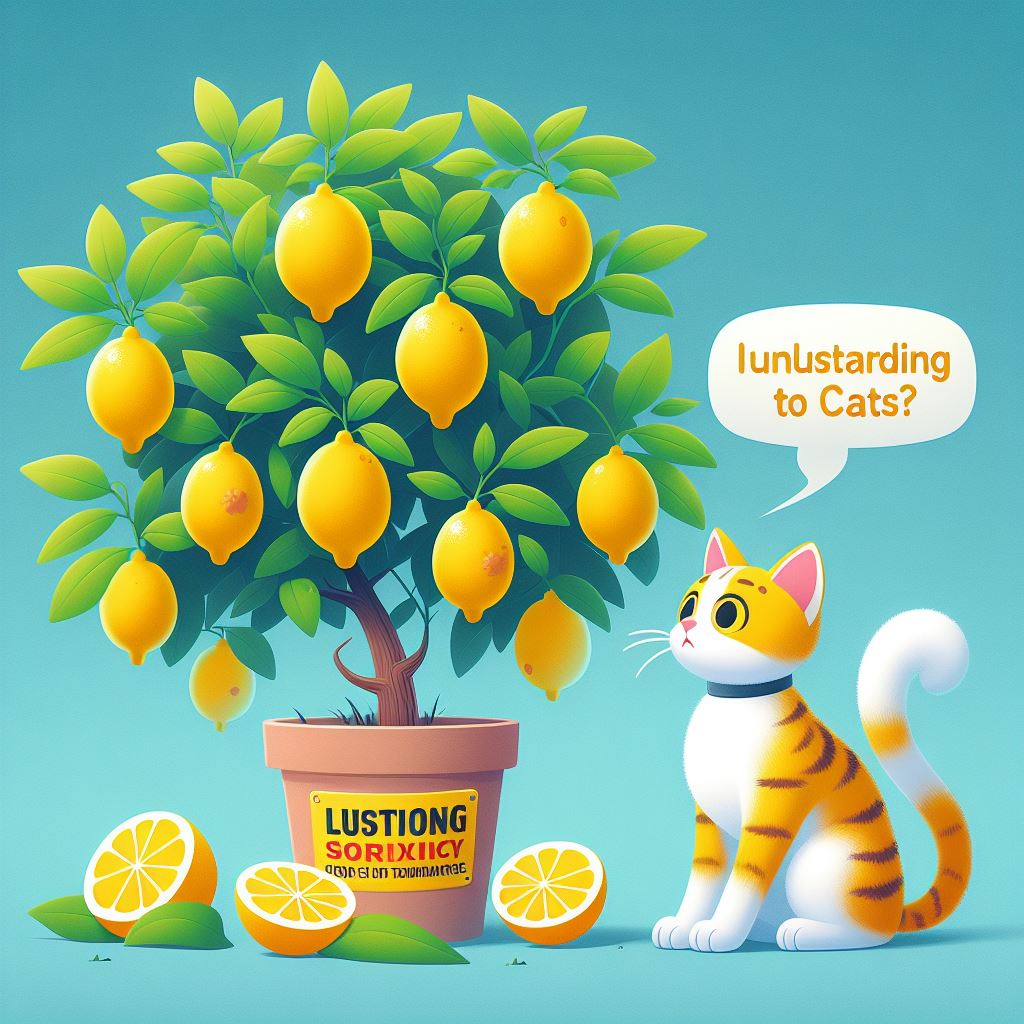
Why Consult a Veterinarian?
- Specialized Care: Veterinarians are trained to handle cases of toxicity in pets, including exposure to plants such as lemon trees.
- Accurate Diagnosis: A veterinarian can conduct the necessary tests to confirm if the symptoms are indeed linked to lemon tree toxicity.
What to Expect:
- Physical Examination: The veterinarian will perform a comprehensive physical examination of your cat to assess symptoms and overall health.
- Diagnostic Tests: This may include blood tests, urinalysis, or imaging studies to evaluate the extent of the toxicity.
Treatment Plan:
- Emergency Care: Depending on the severity of the toxicity, immediate treatment such as inducing vomiting or administering activated charcoal may be necessary.
- Supportive Care: The veterinarian will provide supportive therapies tailored to your cat’s condition, such as intravenous fluids or medication to alleviate symptoms.
Follow-Up:
- Monitoring: After the initial treatment, your veterinarian may recommend monitoring your cat’s progress to ensure recovery.
- Preventive Measures: The veterinarian can offer guidance on preventing future incidents of lemon tree toxicity.
In conclusion, consulting a veterinarian is vital if you suspect that your cat has been affected by lemon tree toxicity. Swift and appropriate action can make a significant difference in your cat’s recovery and overall well-being.
Frequently Asked Questions
Are lemon trees toxic to cats?
Yes, lemon trees are toxic to cats. The leaves, fruit, and branches of lemon trees contain essential oils and compounds, such as limonene and linalool, that can be harmful to cats if ingested. It is important to keep cats away from lemon trees to prevent poisoning.
What are the risks of cats ingesting lemon tree leaves?
Ingesting lemon tree leaves can cause symptoms of toxicity in cats, such as vomiting, diarrhea, depression, and changes in behavior. In severe cases, cats may experience tremors, difficulty breathing, and liver damage. It is crucial to seek immediate veterinary attention if a cat has ingested any part of a lemon tree.
Can cats be allergic to lemon trees?
Yes, some cats can be allergic to the essential oils found in lemon trees. Allergic reactions may include skin irritation, itching, and respiratory issues. It’s important to monitor your cat’s. Behavior around lemon trees and consult a veterinarian if you notice any signs of an allergic reaction.
How can I protect my cat from lemon tree exposure?
To protect your cat from lemon tree exposure, consider keeping your cat indoors to prevent access to outdoor plants. If you have lemon trees in your yard, create physical barriers or use deterrents to keep your cat away from the trees. Additionally, provide plenty of safe and cat-friendly indoor plants for your cat to enjoy.
What should I do if I suspect my cat has been exposed to lemon tree toxins?
If you suspect your cat has been exposed to lemon tree toxins, seek veterinary care immediately. Contact a veterinarian and provide details of the exposure, including any symptoms your cat may be experiencing. Time is critical in cases of poisoning, and prompt treatment can improve your cat’s prognosis.
| Aspect | Details |
|---|---|
| Toxic Components | Citrus fruits contain essential oils and compounds like limonene and linalool, which can be harmful. |
| Potential Risks | Ingestion may lead to gastrointestinal issues, vomiting, and discomfort in cats. |
| Symptoms of Poisoning | Watch for signs like drooling, lethargy, loss of appetite, and digestive distress. |
| Preventive Measures | Keep lemon trees out of reach. Consider pet-safe plants and alternatives. |
| Safe Interaction | Supervise your cat around lemon trees and monitor any unusual behavior. |
| Emergency Actions | Contact your veterinarian immediately if ingestion occurs. Provide details on symptoms and plant exposure. |
| Alternatives | Opt for cat-friendly plants, such as catnip or cat grass, to create a safe environment for your pet. |
This table provides detailed information about the potential toxicity of lemon trees to cats, symptoms of poisoning, preventive measures, safe interactions, and emergency actions. Always consult with a veterinarian for personalized advice regarding your cat’s health.
Are Poppies Toxic To Cats: Is Your Feline Friend at Risk?
Read More Now..






